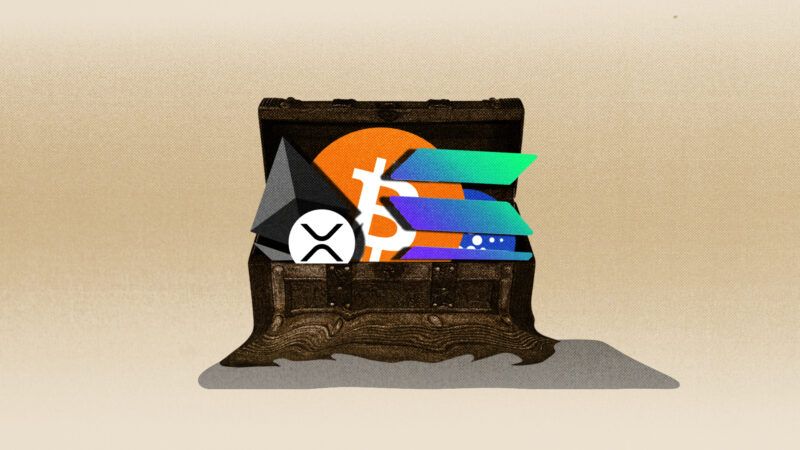Trump's (Un)strategic Crypto Reserve
If the government wants to encourage cryptocurrency innovation, "buying coins is actually a pretty lousy way of doing that," says one economist.

President Donald Trump on March 2 announced the creation of a strategic crypto reserve to include bitcoin, ethereum, XRP, solana, and cardano. Trump says that the "Crypto Reserve will elevate this critical industry" and "make sure the U.S. is the Crypto Capital of the World." It's unclear how subsidizing demand for cryptocurrency would make the industry more innovative.
The details of what a crypto reserve would look like are scant. Nic Carter, co-founder of Castle Island Ventures, a venture capital firm investing in blockchain startups, and a former crypto-asset analyst for Fidelity, spoke to Reason about how it could function. Carter doubts the reserve will be created with monetary intent, i.e., to peg the U.S. dollar to a commodity like bitcoin, which has a "low issuance rate [and] a very predictable supply schedule." Establishing such a crypto reserve, as Sen. Cynthia Lummis (R–Wyo.) suggests in her Boosting Innovation, Technology and Competitiveness through Optimized Investment Nationwide (BITCOIN) Act, which was introduced in the last session of Congress, would "basically signal that we're considering a…soft default," says Carter: "Interest rates would spike dramatically as investors in U.S. debt would start to wonder if the US was considering a hard break" from the current international monetary system, he explained in Bitcoin Magazine in December 2024. No such leading indicators of macroeconomic mayhem have been observed yet.
Carter anticipates that nothing will ultimately come of the president's announcement. Trump campaigned on a crypto stockpile, which would consist of bitcoin already seized and held by the Treasury; he did not campaign on acquiring billions of dollars' worth of cryptocurrencies, which the BITCOIN Act would do. The optics of such an acquisition are also unfavorable: Crypto firms spent "at least $10 million into the Trump inaugural fund," according to Politico. Industry super PACs and wealthy individuals also spent millions of dollars to support the Trump campaign this past election cycle, per CNN.
Economist Peter C. Earle, the director of economics and economic freedom at the American Institute for Economic Research, tells Reason that referring to Trump's proposal to acquire vast amounts of cryptocurrency as a "strategic reserve" is "misleading first and foremost because traditional strategic reserves…like the strategic petroleum reserve [and] China's strategic pork reserve are basically…repositories where large amounts of commodities are held [that] serve economic and security functions." No cryptocurrency serves a security function, and only two, bitcoin and cardano, could plausibly serve the economic role since their supply is algorithmically constrained, explains Earle. Instead, the federal government committing itself to purchasing cryptocurrency would put a "floor under crypto values" and would function as a "sort of soft subsidy."
If the government wants to encourage innovation in crypto, "buying coins is actually a pretty lousy way of doing that," says Earle. It is, however, a good way to instantly reward friends with crypto holdings: the price of bitcoin and ethereum rose by 10 percent, XRP by 30 percent, solana by 20 percent, and cardano by 70 percent following Trump's announcement, reports Al Jazeera. A source at one of the largest institutional-grade crypto prime services firms tells Reason that he hopes Trump "will pump the brakes on the reserve and instead keep working on…rolling back the Biden admin rules that have been holding the industry back."
Earle also sees the proposal as "effectively the first investment in a sovereign wealth fund," which the administration directed the secretaries of the Treasury and Commerce to establish in February via executive order. Earle explains that the U.S., unlike Saudi Arabia and Norway, doesn't need a sovereign wealth fund to diversify investments away from overreliance on oil. Furthermore, Earle cautions that "investments made by an American sovereign wealth fund might be influenced by…who visits the Oval Office" and would likely underperform private investment even absent corruption.
Editor's Note: As of February 29, 2024, commenting privileges on reason.com posts are limited to Reason Plus subscribers. Past commenters are grandfathered in for a temporary period. Subscribe here to preserve your ability to comment. Your Reason Plus subscription also gives you an ad-free version of reason.com, along with full access to the digital edition and archives of Reason magazine. We request that comments be civil and on-topic. We do not moderate or assume any responsibility for comments, which are owned by the readers who post them. Comments do not represent the views of reason.com or Reason Foundation. We reserve the right to delete any comment and ban commenters for any reason at any time. Comments may only be edited within 5 minutes of posting. Report abuses.
Please to post comments


If the
governmentanyone wants to encourage cryptocurrency innovation, "buying coins is actually a pretty lousy way of doing that," says anyone who pays attention.A crypto reserve is a really stupid idea for a government. It's a good idea if you want to reward some pals who currently own crypto.
Really? I am sure Trump/Musk never thought of that. /s
Cryptocurrency reserve, tariff, more borrowing. I believed President Trump would create a recession just he did in his last administration. I did not think he would push so hard for the recession as he seems to be doing.